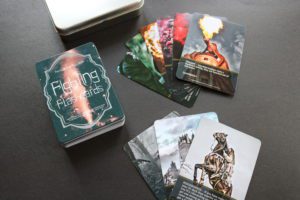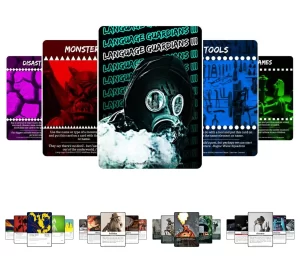I grew up playing card games. That was one of my favorite hobbies, though I certainly wouldn’t describe myself as a hardcore gamer, but more of a casual gamer. I liked to play poker with my family and trading card games with friends. There was also a short stint there where I used to collect sports cards. And as a young teenager, I started dabbling in making my own card games and board games.
Fast forward to university, I decided to become a teacher, and when I graduated I moved to China to teach English. Not long after that, my interest for making card games came roaring back because I realized it was a unique and powerful way to help my friends, my students, and I learn Chinese and English together. I released my first language card game, Chinese Champions, in 2016, and since that time I also released Othertongue, Chinese Champions 2, Fighting Flashcards, and now I’m working on the second edition of Othertongue.
So my goal is to expand your conception of what card games can do to help us learn languages better, faster, and more organically. If you’re a teacher, I intend to give you some ideas for games you can use in your classroom. If you’re a student of languages or thinking of starting to learn a new language, I intend to break down what might seem like a monumental task for you into easy, fun, and practical steps. If you are a gamer, I intend to show you that there are language-learning card games out there, which are as exciting and challenging as the other kinds of games you play every day for other reasons.
To my knowledge, there does not exist another video channel, video series, or website, singularly devoted to the dissemination and popularization of language-learning card game content. This could very well be the first and only one. So if you like gaming and you like learning languages, you are in for a treat!
In this series, we will talk about the purpose of language card games, how to plan a weekly schedule using them, some of their disadvantages, and some practical daily study habits like the Leitner Box and Fighting Flashcards. I also want to share with you some of my personal study habits along the way.
As for the format of the series, this one will include ten episodes and I will try to keep each episode under 5 minutes because I don’t like to ramble and I know that you are busy people, so I hope you’ll be able to easily digest one or two episodes per day perhaps on your way to work, on your way to school, or maybe before you begin a study session to get yourself a little inspiration. I will also put them all in a playlist, so if you like, you can listen to them all at once, which would take about an hour.
Alright that’s it for this episode. Don’t forget to like and subscribe so that you and other likeminded people can find your way back to my latest and greatest content. You can also head over to the Language Card Games’ Shop to buy a game, support what I do, and start playing your way to language-learning success today.

